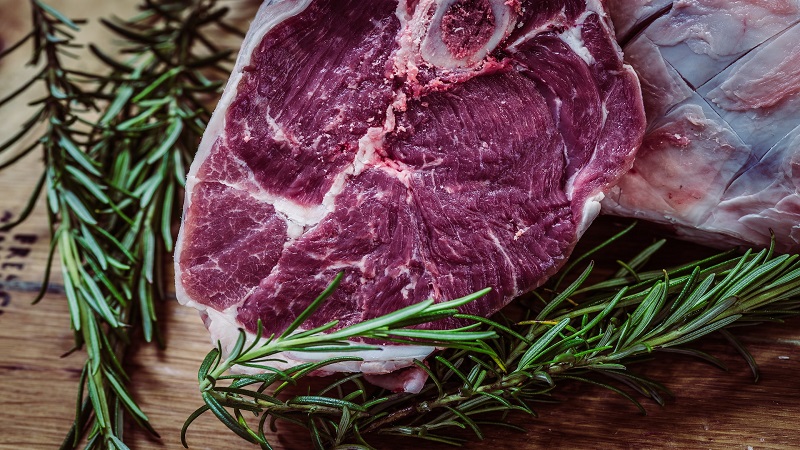Muslims always eat halal meat because of their religious beliefs and values. However, more and more non-Muslims are also eating halal meat because of its supposed health benefits. It has become a multi-billion dollar industry over time due to its growing popularity. But – is halal meat healthier than conventional meat?
In Islamic dietary regulations, “halal” denotes permissible. Specifically, in the context of food or meat, halal meat refers to meat that follows Islamic guidelines for rearing, slaughtering, processing, and preparation.
The Quran commonly uses the terms “Halal” and “Haram” to indicate “Permitted” and “Prohibited” actions.
Halal standards for meat and food ensure that they are nutritious and free from pollutants, dirt, and other bacteria that can be harmful to health. Due to its cleanliness and potential health benefits, halal meat is not only popular among Muslims but also among many other communities.
What is Halal Meat?
Halal meat refers to meat that is prepared according to Islamic dietary laws, which dictate what foods are permissible, or halal, and what is not, or haram, for Muslims to eat.
In the case of meat, the animal must be slaughtered by a Muslim who pronounces the name of Allah at the time of slaughter, and the method of slaughter must be humane and involve severing the carotid artery, jugular vein, and windpipe of the animal to allow the blood to drain from the body. The animal must also be healthy at the time of slaughter and must not have been killed by any other means before slaughter.
Halal meat can come from a variety of animals, including cows, sheep, goats, chickens, and turkeys, and is often consumed by Muslims as a way to ensure that their diet is per their religious beliefs.
Difference between Halal Meat and Regular Meat
The main difference between halal meat and regular meat is the method of slaughter. Halal meat is prepared by slaughtering the animal by hand while reciting the name of Allah, and cutting the carotid artery, jugular vein, and windpipe of the animal to allow the blood to drain from the body. The animal must also be alive and healthy at the time of slaughter, and must not have been stunned or killed by any other means before slaughter.
In contrast, regular meat may be prepared using a variety of methods, including stunning the animal before slaughter, using mechanical methods to kill the animal, or using chemical agents to slaughter the animal. These methods are often used in non-halal meat production, and they are not by Islamic dietary laws.
While the method of slaughter is the most significant difference between halal meat and regular meat, there can be differences in the quality and nutritional content of the meat as well. This can depend on factors such as the animal’s diet, age, and living conditions, as well as the processing and cooking methods used. Ultimately, the choice of whether to consume halal or non-halal meat is a personal preference based on individual dietary and religious beliefs.
Is Halal Meat Healthier than Jhatka?
It is not accurate to compare the health benefits of halal meat with jhatka, as jhatka is not a type of meat. Jhatka is a method of animal slaughter commonly practiced by some Sikh and Hindu communities, which involves slaughtering the animal with a single blow to the head, often with a sword or an axe.
In terms of the nutritional content of meat, the quality and nutritional value of meat depend on various factors such as the animal’s diet, age, and living conditions, as well as the processing and cooking methods used. Therefore, the nutritional value of halal meat and jhatka meat can vary depending on these factors.
It’s worth noting that some people may choose halal meat or jhatka for ethical or religious reasons, rather than for perceived health benefits. Ultimately, the choice of whether to consume halal or jhatka meat is a personal preference based on individual dietary and religious beliefs.
Is Halal Meat Healthier than Conventional Meat?
Muslims do believe that halal meat is much healthier than regular meat. According to them, it not only tastes better but is also more hygienic and thus safer to eat. Halal meat is taken from animals fed on a vegan diet and therefore, their meat is free of all stress-related hormones.
However, scientifically, there is no conclusive evidence to suggest that halal meat is healthier than regular meat. The main difference between halal meat and non-halal meat is the method of slaughter, which is carried out according to Islamic dietary laws. Halal meat is prepared by slaughtering the animal by hand, and the meat is not considered halal if the animal was already dead before slaughter.
From a nutritional perspective, the quality of the meat depends on factors such as the animal’s diet, age, and living conditions, as well as the processing and cooking methods. Therefore, the nutritional value of halal meat can vary widely depending on these factors.
It’s worth noting that some people may choose halal meat for ethical or religious reasons, rather than for perceived health benefits. Ultimately, the choice of whether to consume halal or non-halal meat is a personal preference, and individuals should choose the type of meat that aligns with their values and dietary preferences.
Is Halal Meat Organic?
Not all halal meat is organic, as the two terms refer to different things.
Halal is a religious practice for slaughtering animals, which emphasizes a painless death, recitation of prayer during the process, and draining of all blood from the animal after slaughter.
Organic meat, on the other hand, refers to meat that has been produced without the use of synthetic fertilizers, pesticides, antibiotics, or hormones. Organic meat must also come from animals that have been fed organic feed and have had access to the outdoors.
While it’s possible for halal meat to also be organic, it’s not a given. Some halal meat may come from animals that have been raised on conventional feed, treated with antibiotics or hormones, or exposed to synthetic fertilizers and pesticides. Therefore, it’s important to look for organic certification in addition to halal certification if you’re looking for organic halal meat.
Is Halal Meat More Expensive?
The price of halal meat can vary depending on several factors, such as the location, availability, and demand for halal meat in a particular region. In some cases, halal meat may be more expensive than non-halal meat due to the additional costs associated with following the specific Islamic dietary regulations for the slaughtering process.
For example, the requirement of using a trained Muslim slaughterer for halal meat, the cost of halal certification, and the cost of sourcing and raising animals that meet the Islamic dietary requirements can all contribute to a higher price for halal meat. Additionally, halal meat may also come from smaller, independent farms or suppliers, which can result in a higher price point compared to mass-produced non-halal meat from larger suppliers.
However, it’s worth noting that the price of halal meat is not always higher than non-halal meat. In some cases, halal meat may be similarly priced or even less expensive than non-halal meat, especially if it’s sourced from local farms or suppliers.
Scientific Benefits of Halal Meat
There is limited scientific research specifically on the health benefits of halal meat compared to non-halal meat. However, some potential benefits of halal meat based on scientific studies are as below:
- Reduced bacterial contamination: Halal meat is required to be slaughtered using a method that ensures the complete draining of blood from the animal. This can reduce the risk of bacterial contamination, which may result in a lower risk of foodborne illness.
- Reduced stress in animals: Islamic dietary regulations require that animals be treated humanely and with minimal stress during the slaughtering process. Studies have suggested that reducing stress in animals before slaughter can result in higher meat quality, with improved tenderness and taste.
- Healthier animal feed: Islamic dietary regulations also require that animals be fed a diet that is free of certain substances, such as animal by-products and genetically modified organisms (GMOs). This may result in healthier meat, with lower levels of contaminants and potentially higher nutrient content.
- No use of hormones or antibiotics: Some halal certification programs prohibit the use of hormones or antibiotics in animal feed, which may result in meat that is free of these substances.
- Ethical considerations: For individuals who choose halal meat for religious or ethical reasons, the consumption of halal meat may provide psychological and emotional benefits.
- More importantly, it is the least painful method to kill an animal for food.
It’s important to note that these potential benefits are not unique to halal meat and may also be present in non-halal meat produced using similar methods. Additionally, individual factors such as animal diet, living conditions, and processing methods can also impact the nutritional value and safety of meat, regardless of whether it’s halal or non-halal.
Also Read: Can You Eat Beyond Meat Raw?
Frequently Asked Questions
Is halal meat better than organic?
The farms that produce kosher, halal, and traditional meat typically use the same types of pesticides and generate similar waste. However, the methods used in the final days and slaughter of animals for kosher and halal meat are generally considered to be more humane than those used for traditional meat. Therefore, if animal welfare is a priority, choosing kosher or halal meat may align better with your ethical values.
Why do Muslims eat beef?
Muslims eat beef, as well as other types of meat, as it is considered permissible (halal) in Islamic dietary laws. The Quran and the Hadith, the two primary sources of Islamic teachings, do not prohibit the consumption of beef or any other specific type of meat. Beef is a common source of protein in many Muslim-majority countries and is often featured in traditional dishes such as kebabs, stews, and curries.
Why do non-Muslims eat halal meat?
Many individuals opt to consume halal meat because they believe it to be a cleaner, healthier, and more ethical choice. This is due to the requirements set forth by Islamic law, which mandate that the animal is treated well and fed a natural diet free from hormones, antibiotics, and animal byproducts.
Final Thoughts
In conclusion, while there is no clear evidence that halal meat is inherently healthier than conventional meat, there are some potential benefits to consuming halal meat. Halal meat must be produced per specific dietary laws that mandate the humane treatment of animals, as well as their feeding and handling.
Additionally, the practice of draining all blood from the animal after slaughter may have some hygienic benefits. However, the nutritional value of halal meat is largely dependent on factors such as the animal’s diet and the quality of the meat itself. Ultimately, the decision to consume halal meat or conventional meat will depend on individual preferences and dietary needs.

